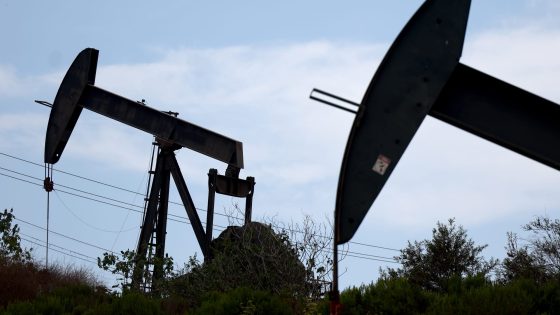Oil pumpjacks operate on July 31, 2023 in Los Angeles, California.Â
Mario Tama | Getty Images
Oil prices hit seven-week highs on Wednesday as summer demand optimism and concerns over escalating conflicts offset an industry report that said U.S. crude inventories unexpectedly rose.
Brent crude futures gained 23 cents, or 0.3%, at $85.56 a barrel by 1525 GMT, while U.S. West Texas Intermediate crude was up 18 cents, or 0.2%, at $81.75 per barrel.
“The current snapshot presents an underwhelming picture but there are green shoots that indicate a more optimistic outlook,” said Tamas Varga of oil broker PVM.
The Brent price being $8 over the lows hit in early June “shows genuine optimism that the global oil balance will eventually tighten,” Varga added.
Both benchmarks, having recovered strongly in the last two weeks, gained more than $1 in the previous session to seven-week peaks after a Ukrainian drone strike led to an oil terminal fire at a major Russian port.
In the Middle East, Israeli Foreign Minister Israel Katz warned of a possible “all out war” with Lebanon’s Hezbollah, even as the U.S. attempted to avoid a broader conflict between Israel and the Iran-backed group.
An escalating war risks supply disruption in the key oil-producing region.
“Any cooling off between both parties seems difficult in the near term, which may keep oil prices well-supported as market participants shrug off pockets of weakness on the economic front, from weaker-than-expected U.S. retail sales to mixed sets of data out of China this week,” said Yeap Jun Rong, a market strategist at IG in Singapore.
China data this week showed May industrial output lagged expectations, but retail sales, a gauge of consumption, marked the quickest growth since February.
Meanwhile, U.S. crude stocks rose by 2.264 million barrels in the week ended June 14, market sources said on Tuesday, citing American Petroleum Institute figures. Analysts polled by Reuters had expected a 2.2 million barrel draw in crude stocks.
However, gasoline inventories fell by 1.077 million barrels, while distillates rose by 538,000 barrels, the sources said, speaking on condition of anonymity.
Official stocks data from the U.S. Energy Information Administration is due on Thursday.
Source Agencies



